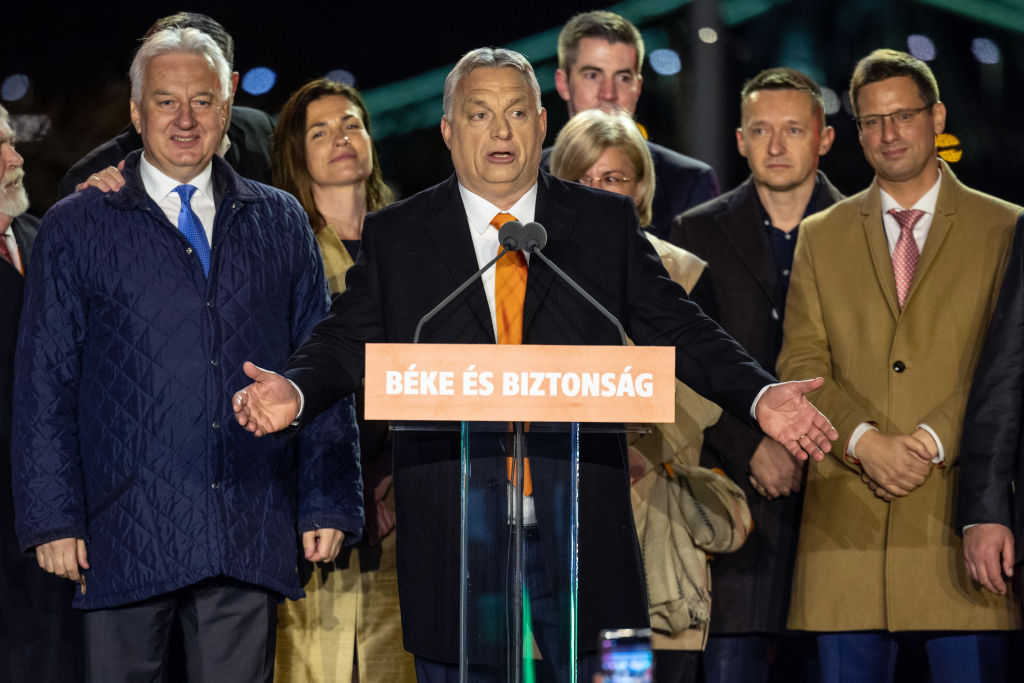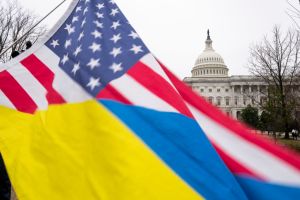Viktor Orbán has just won another election. The Hungarian prime minister has secured a hefty majority in his country’s legislative elections, and in his victory speech, Orbán revealed once again that he is a thorn: in the side of Europe most obviously but, if need be, in the side of all.
I’ll leave for others the discussion of Hungarian democracy — whether Orbán has so manipulated national life that his continued electoral successes are unimpressive, even fraudulent. But Orbán, in his own mind, thought an “overwhelming force” ranged against him.
“We never had so many opponents,” Orbán said. “The left at home, the international left all around, the Brussels bureaucrats, the Soros empire with all its money, the international mainstream media, and in the end, even the Ukrainian president.”
Orbán said his “huge victory” and vote total of 53 percent could be seen “from the moon, but certainly from Brussels as well.”
It’s clear Orbán feels embattled and believes his country is actively persecuted by the European Union, whose integrationist programmes do not accord with Orbán’s determination to maintain Hungarian sovereignty, as he understands it, possible only under his rule.
Orbán rejects the EU line on refugee resettlement; he dislikes lectures from Brussels on press freedom, judicial independence and the necessity of domestic political opposition; he accuses EU leaders of being unchristian and unresponsive to the persecution of Christians not only across the world, but also, one presumes, in Europe.
All this is old news and largely, in Orbán’s case, proforma.
So too, even, are the fights of recent years between Hungary and Brussels. When Brussels censured Hungary for its democratic backsliding under Article 7 of the Treaty on European Union, the Hungarian state launched legal challenges. But since those challenges were defeated, Orbán’s disagreement has shifted gears. Rather than fight in the specific, he retreats to the general.
Most of the bogey figures of Orbán’s rhetoric are either amorphous (bureaucrats) or unchanging emblems (George Soros). They have been added to Orbán’s long list of reasons why Hungary is the most persecuted European nation, led by the most persecuted European leader.
Orbán’s problem with Europe is largely that it is an institution he cannot bend to his will. No supermajority in the Hungarian parliament will ever make Brussels change its tack. He cannot replace its judgments or win over its media. He is diametrically opposed to European integration and to the broad swathe of European politics — common purpose, common identities, common plans. It’s unsurprising, therefore, that events which force others to think again have only passing significance for someone so rigid and contrary.
EU circles are full of one particular analogy: the invasion of Ukraine is “Europe’s 9/11.” Unlike 9/11, though, few (and certainly not thousands of them) EU nationals have been killed. But it is a similar moment of disillusion, nonetheless. The scales have fallen from their eyes. They now know, they tell themselves, that Vladimir Putin is an unstable tyrant, insatiable in territorial demands, and someone who cannot be reasoned or dealt with. Disarmament is no longer advisable. Passivity is no longer permissible. And so on.
As this new consensus emerged, Orbán — nominally among European nations in condemning Russian aggression — demurred. Now we know why he did. A few newspapers suggested that Orbán was softening his stance on Putin’s Russia — born of electoral expediency and personal revulsion at Russian aggression. It could never last.
Naturally Orbán was more conflicted than many EU leaders. Putin was an ideological confederate of his. They talk about the Christian god roughly the same amount and both see Brussels as encroaching on what they consider to be theirs. Putin and Orbán get similar mileage out of talk of “gender freedoms” (Putin) and “gender insanity” (Orbán), the European elite and sundry other things.
Orbán was less enthusiastic than most EU leaders have become about arming Ukraine. Hungarian diplomats have played the spoiler in EU committee rooms — so much so that Poland, a fellow national conservative-run state which, unlike Hungary, has mobilized money and armaments in opposition to Russia, may soon not be much of a friend.
When the Ukrainian president, Volodymyr Zelenskyy, singled out Orbán in a speech to EU leaders on March 25, telling Orbán to “pick a side” and even inviting him to visit Budapest’s own Holocaust memorial, it became clear that Zelenskyy’s words would not simply rankle Orbán. They would also, fairly seamlessly, work their way into Orbán’s view of personal victimhood and national abjection, before a collection of foreigners who all seem, sinisterly, to agree with each other.
Orbán distanced himself from the EU party line, though he could never have stuck with a crowd of EU states even if he agreed fundamentally that Russia was entirely in the wrong and should never be dealt with again in the same way as before. Orbán is a thorn in Brussels’s side; he could never accord with its policy. And the fact that Brussels is willing and able to isolate Putin would worry any Hungarian leader who has so comprehensively alienated Brussels.
European leaders have achieved real unity in five weeks of war. For the moment, everyone seems animated with new purpose. But soon enough, Orbán once again became a problem. It is what he does. He knows no other way.
Crises can unite. But time marches on. Boredom and contrariness soon set in among those inclined to either. People and leaders return to their previous positions, like weights hung by string from a nail and swung, hard, in one particular direction. And for Orbán, newly empowered in Hungary, that position remains that of the thorn.


















